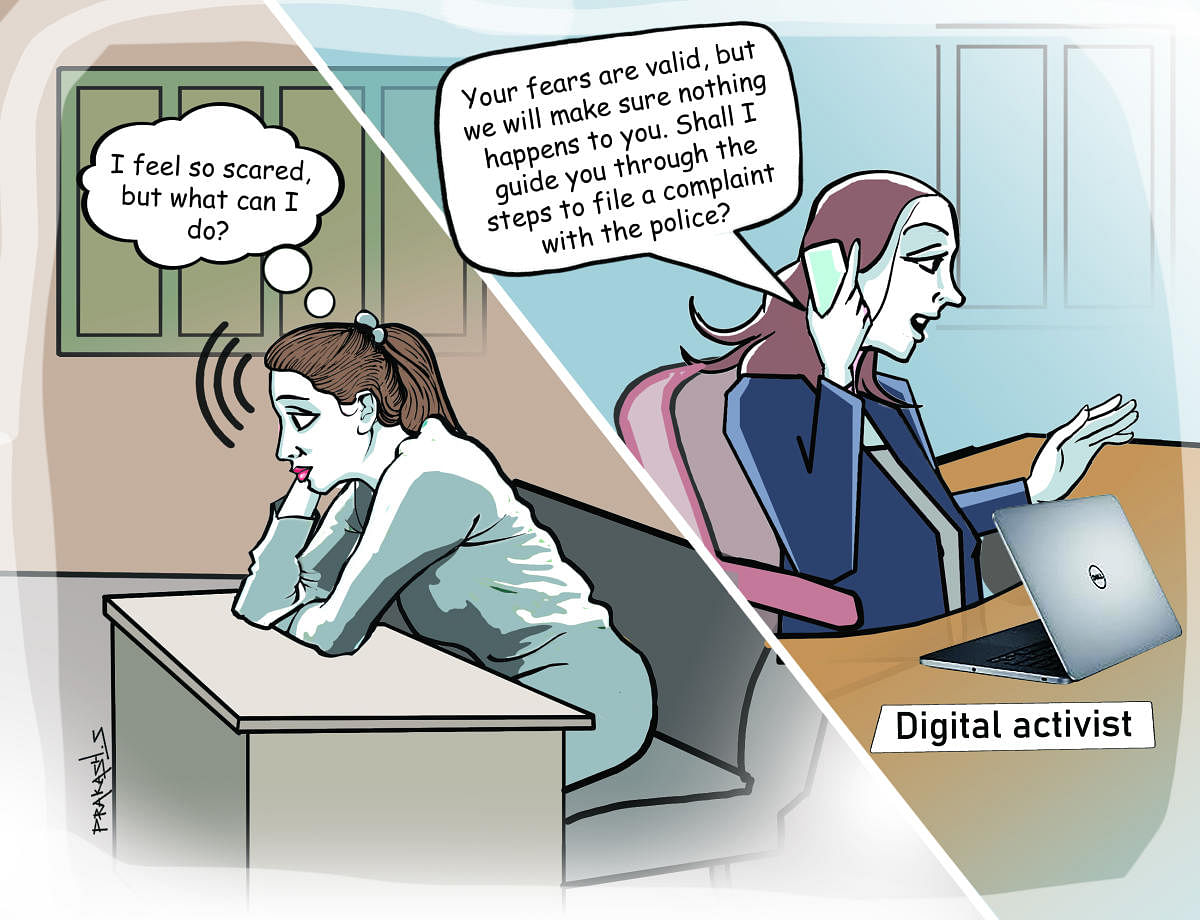
Many organisations are actively working to make online spaces safe for women, children and sexual minorities.
Report Abusers
Started only 20 days ago by a group of 10 activists, Report Abusers aims to tackle abuse on social media platforms, especially Twitter.
It has already received 100-plus complaints. “It is much easier to create fake profiles on Twitter than on Instagram and Facebook,” says a team member.
The idea emerged from a conversation between two friends. They then asked people on Twitter about their trolling and abuse problems. “We are motivating people to raise complaints. We work towards identifying people behind fake profiles, and provide details and solutions so they can take action,” he says.
* Contact @ReportAbusers on Twitter
Digital Empowerment Foundation
Founded by Osama Manzar and Shaifali Chikermane in 2002, Digital Empowerment Foundation works in the area of digital literacy.
Working from an office in Delhi, it disseminates information and provides training at the district level. While earlier its training sessions were offline, they turned hybrid last year, and fully online two months ago. “Culturally and socially, the concepts of privacy and security are not easy to change,” says Manzar.
* Contact def@defindia.net to know more.
Point of View
A non-profit working in the area of gender, sexuality and women’s rights, Point of View began operations from Mumbai in 2015.
“We noticed online violence picking up in 2010, but by 2013-14 it had started growing rapidly,” says Bishakha Datta, co-founder and executive director.
The group uses technology to help girls, women, trans people and sexual minorities safely navigate digital spaces.
“We have noticed that even teen girls with basic phones are getting harassed constantly,” she says. “If you have a phone, you are a target.”
The NGO has been conducting digital safety workshops all over the country. “Concepts such as creating a strong password and what to do in situations that constitute harassment are covered,” she says. It hopes to set up a helpline for women and children who face digital violence. “A rape threat wouldn’t be so casually thrown around in person. But it is easy to just type something vile and send it. The severe impact on the mental and emotional health of victims is not recognised enough,” she says.
* Contact info@pointofview.org for more information.
Cyber Saathi
NS Nappinai, Supreme Court advocate and founder of Cyber Saathi, has been specialising in cyber laws even before the IT Act came into being in 2000.
Since 2003, she has been training the police, judiciary and industry verticals. In 2017, a Chevening fellowship took her to the UK, where she was able to gain an understanding of how cybersecurity is critical to children and women. That year, she was appointed as the amicus curiae in the Prajwala case, where the anti-trafficking organisation filed a PIL in the Supreme Court petitioning the government to create a ‘victim protection protocol’ to protect the rights of victims of trafficking. She was also appointed to a committee to suggest measures to curb child abuse. All these experiences, she says, culminated into the creation of Cyber Saathi. “As a criminal law practitioner, I have realised that victims seek help from a friend when they are in trouble, and 90 per cent of the time, the friends misguide them,” she says.
* Reach out to contact@cybersaathi.org
Akancha Against Harassment
This group was launched in February 2017, after techie Akancha Srivastava was stalked. She did not know how to file a complaint, and she realised many others didn’t either.
Abuse, blackmail, revenge porn, morphing and shaming are among the complaints she addresses.
“Requests that have terms like ‘acid attack’, ‘kill’, ‘rape’ are looked into immediately. An instance of body shaming, while terrible, falls low on the priority list,” she explains. The group, with an office in Mumbai, reaches the victim over the phone. “One of the first questions we ask is whether they have filed a complaint. In most cases, the answer is ‘no’ because they are scared of their family’s reaction. We counsel them to file a complaint,” she says. The group also intervenes when the police refuse to register a complaint or delay the investigation.
* Contact HelloAkancha@gmail.com for queries.
Solidarity foundation
Started in 2013 with the aim of empowering grassroots sex workers and LGBTQIA, the Bengaluru-based organisation provides leadership and mental health training among other things.
“Most sex workers have feature phones while trans people have smartphones. Their usage and exposure vary. Our workshops address both,” says Shubhangani Jain, programme officer.
Trans people active on social media sometimes find their pictures being used by people threatening to out them to their families. “So we talk to them about privacy settings,” she explains.
For those with basic phones, the risk comes from their numbers being circulated without their permission. They also get lewd messages. Acceptance, not just from society but from various institutions, is key to ending their woes, she says.
*Reach out to them on solidarityfoundation2013@gmail.com or 4099 0154.
Lewd messages
Many women volunteers who have shared their numbers offering pandemic-related help have been receiving lewd calls and messages. The harassment varies from blank calls and relentless messages to requests for nude photos. This has forced many women to make their messages and numbers private. Sections of the IPC, as well as the IT Act, can protect victims in such situations. They simply need to register a complaint with the cyber police, say activists.
Systemic solutions
Social conditioning and gender norms have to change, and women have to learn to fight back, say activists. Report Abusers says Twitter should deter people from creating fake accounts. Advocate N S Nappinai says it is important for the authorities to help, and not preach to the victim.